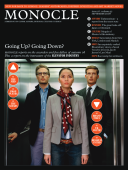
Issue 16
Going Up? Going Down? Monocle reports on the ascenders and free-fallers of autumn 08. Plus, a report on the innovators of the elevator industry.
In This Issue
Oops! No content was found.
Looks like we no longer have content for the page you're on. Perhaps try a search?
Return Home

